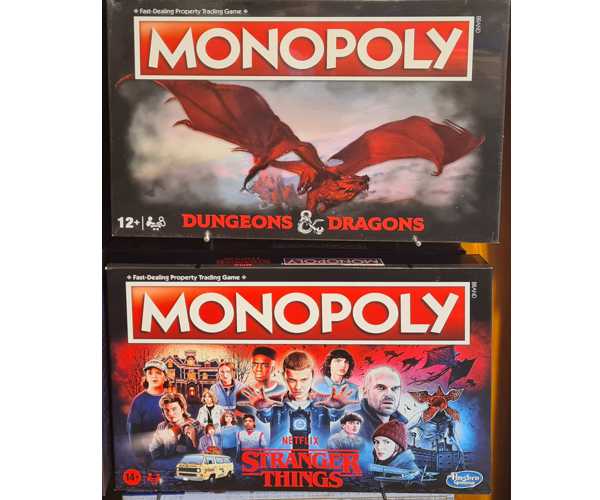
So they're both Monopoly, with the same rules, but they have different dressings. They also have different recommended ages: 12+ for D&D Monopoly and 14+ for Stranger Things Monopoly. Regular Monopoly has a recommended age of 8+.
In the past, when games had a recommended age to them it was an indication of how complicated the game was. That can't be true here, though, because the rules for D&D Monopoly and for Stranger Things Monopolyare the same as for regular Monopoly.
The D&D Monopoly board goes from "Kobolds" to "Tarrasque" and features monsters. The Stranger Things Monopoly board goes from "Wheeler House" to "Creel House" and features houses. What these age suggestions seem to be telling us is that children aged 12 can handle static images of fantasy monsters, but they have to be 14 before they can be exposed to static images of people's houses.
If there were child-safety implications to do with the size of pieces or something, that would affect the age rating, but that's not the case here. The components are all similar sizes.
One possible answer is that Hasbro wants to shield itself from potential lawsuits alleging that they're encouraging children to play D&D or watch Stranger Things below the recommended ages for those intellectual properties. Hasbro itself makes D&D, which it rates as 12+; they must know there's a huge difference between the complexity of the two games. that said, although Stranger Things is rated TV-14 by the TV Parental Guidelines system, Netflix rates it 15.
Whatever, this practice of defensive recommended ages does mean that when you see one on the front of a game, it doesn't tell you a great deal. I suspect a lot of parents who regularly buy board games pretty well ignore it, and those who buy them infrequently either also ignore it or they believe it and only buy games that are apparently age-appropriate. In the latter case, the children concerned are likely to find the game too simple and therefore not be inclined to try other board games.
Maybe if they took out age recommendations altogether and simply rated complexity along with PEGI-style content indicators, that might work. It would require a change in US and EU legislation, though, so we're likely to be stuck with lying age-recommendations for quite some time.